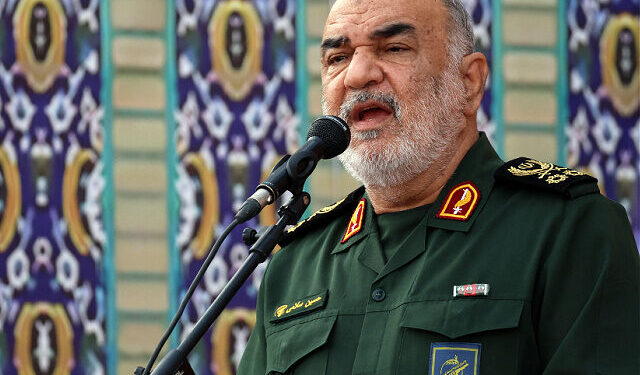In a bold and high-impact military operation, Israel launched airstrikes on Iranian soil, successfully eliminating Major General Hossein Salami, the powerful and provocative commander of Iran’s Islamic Revolutionary Guard Corps (IRGC). Iran’s own state media, the Islamic Republic News Agency (IRNA), confirmed Salami’s death early Friday morning local time, sending shockwaves across the region.
This move marks a massive blow to the Iranian regime—militarily, politically, and symbolically. Salami was not just any general; he was the architect of Iran’s aggression across the Middle East, responsible for orchestrating the regime’s terror connections with Hamas, Hezbollah, and the Houthis. And perhaps most critically, he had been Iran’s loudest voice against Israel and the United States.
According to IRNA, Salami was killed in Tehran, during what Iranian authorities called an “assassination.” Though details remain sparse, Iranian state media confirmed multiple Israeli airstrikes across the capital and surrounding military installations. PressTV, another Iranian outlet, later acknowledged that several other high-profile regime members were also killed, including two nuclear scientists.
The scientists—Mohammad-Mehdi Tehranchi and Fereydoon Abbasi—played key roles in Iran’s controversial nuclear program. Their deaths signal that Israel wasn’t simply making a political statement; it was strategically targeting the infrastructure of Iran’s rapidly advancing nuclear weapons ambitions.
According to The Times of Israel, the Israeli Air Force also struck the Natanz uranium enrichment facility, one of the most notorious nuclear sites in Iran. While Israel has not formally confirmed every target, Prime Minister Benjamin Netanyahu addressed the nation Friday morning, calling the mission “Operation Rising Lion.”
“This operation will continue for as many days as it takes,” Netanyahu declared.
“Iran is taking active steps to weaponize its enriched uranium stockpile… a clear and present danger to Israel’s survival.”
He continued:
“We are defending the free world from the terrorism and barbarism that Iran fosters and exports across the globe… thanks to your determination and courage, citizens of Israel, and thanks to the bravery of Israel’s fighters, the world will be a safer place.”
This is perhaps Netanyahu’s most forceful statement in recent months—and it underscores Israel’s willingness to take decisive action when the world drags its feet.
Major General Hossein Salami was no ordinary commander. He led the IRGC, a U.S.-designated terrorist organization and arguably the most powerful military force within Iran’s regime. Salami’s role went far beyond the battlefield—he was the mouthpiece of Iran’s hatred, regularly threatening to destroy Israel and America.
In his final public appearance on Thursday, just hours before the strike, Salami delivered yet another hostile speech:
“We are war-tested and experienced. We have built strength and developed a strategy in our plans… We monitor the depth of the enemy’s army and… have practiced our plans.”
That speech came in response to growing chatter about an Israeli strike following a scathing report from the International Atomic Energy Agency (IAEA). The U.N. agency announced this week that Iran was nearing the capability to build a nuclear weapon and had been violating key non-proliferation commitments.
The IAEA’s report, backed by Director General Rafael Grossi, said Iran was operating secret illicit enrichment sites, tampering with evidence, and accelerating uranium production—clear red flags for any nation concerned about global stability.
While Israel took bold action, diplomatic talks between Iran and the U.S. were scheduled to resume this Sunday for the sixth round of nuclear negotiations. Now, those talks are in question. As of now, neither Iran nor the Biden administration has commented on whether they will continue as planned.
Iranian state media confirmed that Chief of Staff Major General Mohammad Bagheri survived the attacks and is now in Iran’s war room, planning the country’s next move.
That said, Iran’s top general may be gone—but his legacy of provocation and terrorism lives on. Salami spent years openly mocking the United States and predicting the downfall of Israel and America. As recently as May, he said:
“If you make the slightest mistake, we will open the gates of hell for you.”
But it appears those very gates have now been opened—on Iran.
This is a game-changing moment in the Middle East. By eliminating Salami and striking key nuclear infrastructure, Israel has signaled it will not wait on diplomacy while Iran plays dangerous games with nuclear power. Prime Minister Netanyahu has made it clear: “Operation Rising Lion” is far from over.
With Iran wounded and its leadership rattled, the world now watches: Will this lead to war, or will it stop one from ever starting?
As conservative outlets like Breitbart have long warned, Iran’s unchecked ambitions were a ticking time bomb. This strike may have bought the free world more time—and may even save lives in the long run.
Stay tuned. This story is just beginning.




















